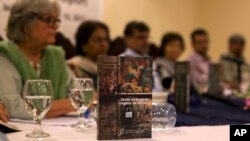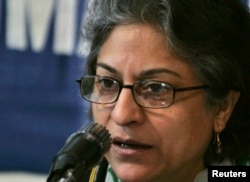A new report warns that religiously motivated vigilantism has risen in predominantly Sunni Muslim Pakistan with “a very frightening tendency” toward accusing people of blasphemy allegedly to intimidate critics of civilian and military authorities.
The independent Human Rights Commission of Pakistan (HRCP) has documented the trend in its annual report issued Wednesday in Islamabad.
The report said that in 2016, authorities arrested 15 people on blasphemy charges, including 10 Muslims and five members of religious minorities, which form 5 percent of the nearly 200 million Pakistanis.
'Mob violence and mob justice'
HRCP's Asma Jahangir, who has served as U.N. Special Rapporteur on freedom of religion, said incidents of “mob violence and mob justice” in the name of Islam in Pakistan are continuing into 2017. She called on the government to demonstrate its neutrality and undo a prevailing “atmosphere of fear” by outlawing incitement of violence in the name of religion.
“For years and years people have been given impunity if they kill in the name of religion. You can kill in the name of religion, you can rob in the name of religion, you can cheat in the name of religion, and you have impunity and that is what the state must end. This cannot go on and it is doing no service to our religion,” said Jahangir.
There was no immediate response from the government in Islamabad, although the state-run telecommunications agency has regularly warned internet users not to post any content that might be construed as blasphemous.
The latest such warning, issued on Tuesday, said content considered blasphemous is a punishable offense under the law.
Critics said the warning would encourage religious fanatics.
Laws carry death penalty
The controversial anti-blasphemy laws carry the death penalty for anyone convicted of insulting the Prophet Muhammad and imprisonment for life for desecrating the Quran, the Muslim holy book, although no one has been executed.
Mere allegations and even calls for reforming the legislation to deter its misuse have provoked mob violence and lynchings.
Last month, a 23-year-old university journalism student in the city of Mardan was killed by a vigilante mob of mostly fellow students. The deceased was accused of “publishing blasphemous content online,” although an ongoing police investigation into the incident has so far found no evidence to support the allegations.
Student's death prompts calls for reform
Mashal Khan's death generated nationwide outrage and protests, reigniting calls for reforming blasphemy laws.
Days later, a member of the minority Shi'ite Muslim sect was gunned down in a central Pakistani town by three sisters for allegedly making blasphemous remarks 15 years ago.
The assailants have since been taken into police custody and confessed to the death, saying an area religious cleric incited them to kill the man who had just returned to Pakistan after fleeing the country to avoid being arrested or killed at the time he was accused of blasphemy.
“We find that there is a pattern in some of these cases where a large number of cases has been filed in various cities against media owners, media persons, people who have criticized the security forces,” said Jahangir. She added that HRCP deplored the situation with regard to freedom of speech in the country where six journalists and bloggers were killed in 2016.
Bloggers detained
Earlier this year, several social media bloggers were briefly detained, allegedly by state security institutions, for criticizing the military in their online postings.
The men left Pakistan immediately after they were freed because some commentators on local media had accused them of posting blasphemous material online.
“There is a kind of an onslaught on a liberal ideology, or people with liberal ideology in Pakistan which is a real threat, therefore space is shrinking not only for non-governmental organizations … but for everybody who does not agree with the official fanatic kind of point of view," Jahangir noted.
HRCP's report also expressed concerns about an increase in attacks on the minority Ahmadi sect, describing the community as “the worst hit” among religious minorities.
Security agencies criticized
The commission again called for abolition of the death penalty, saying Pakistan was among the world's most prolific enforcers of the death penalty. It said that 87 prisoners were executed in 2016 while more than 400 others were sentenced to death last year.
The report criticized Pakistani security agencies for not ending illegal detentions of people in the name of fighting terrorism.
“I think picking up people in this manner is something that the Human Rights Commission [of Pakistan] absolutely deplores and will continue to deplore,” Jahangir observed.
HRCP's report noted a 45 percent decline in militancy and terrorism-related deaths in Pakistan in 2016 compared to the year before, although the violence was on the increase during the first quarter of this year.





